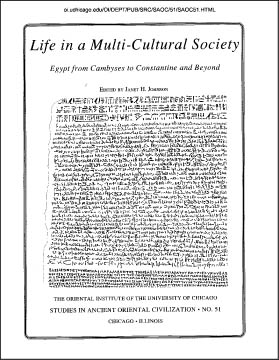SAOC 51. Life in a Multi-Cultural Society: Egypt from Cambyses to Constantine and Beyond Janet Johnson

Egypt from its incorporation into the Persian empire in 525 B.C. was home to a multi-cultural society with several strong cultural traditions. An Egyptian majority population lived in contact (sometimes closer, sometimes more distant; sometimes more frequent, sometimes less frequent) with non-Egyptian populations who had come to reside in Egypt. By the hellenistic period these non-Egyptian populations included large numbers of Greeks and Macedonians who had settled in Egypt after its conquest by Alexander the Great, as well as Jews and other semitic-speaking people from Syria-Palestine; after Egypt's incorporation into the Roman empire, Roman citizens and Roman soldiers from around the empire appear more and more frequently. Integrated study of the period from Cambyses to Constantine (a period of almost 1,000 years), therefore, requires knowledge and appreciation of the material remains (documentary, artistic, architectural, and archaeological) and cultural antecendents of several cultures. The rich documentary and "archaeological" resources preserved from this period would allow it to serve as a model for analysis of other multi-cultural societies.
- Studies in Ancient Oriental Civilization 51
- Chicago: The Oriental Institute, 1992
- ISBN: 0-918986-84-2
- Pp. xxvii + 514; 10 figures; 32 plates; 5 tables
- Paperbound 9 x 11.75 inches
Contributors and Contributions
Allam, Schafik
Observations on Civil Jurisdiction in Late Byzantine and Early Arabic Egypt
Andrews, Carol A. R.
Unpublished Demotic Texts in the British Museum
Bianchi, Robert Steven
The Cultural Transformation of Egypt as Suggested by a Group of Enthroned Male Figures from the Faiyum
Brashear, William
Egyptians and Greeks in an Early Laographia Account (P. Berol. 25161)
Burstein, Stanley M.
Hecataeus of Abdera's History of Egypt
Clarysse, Willy
Some Greeks in Egypt
Corcoran, Lorelei H.
A Cult Function for the So-Called Faiyum Mummy Portraits?
Cruz-Uribe, Eugene
The Lake of Moeris: A Reprise
Darnell, John Coleman
The Kbn.wt Vessels of the Late Period
el-Aguizy, Ola
About the Origins of Early Demotic in Lower Egypt
Farid, Adel
Three Mirrors with Demotic Inscriptions
Gallo, Paolo
The Wandering Personnel of the Temple of Narmuthis in the Faiyum and Some Toponyms of the Meris of Polemon
Hanson, Ann Ellis
Egyptians, Greeks, Romans, Arabes, and Ioudaioi, in the First Century A.D. Tax Archive from Philadelphia: P. Mich. inv. 880 recto and P. Princ. III 152 revised
Heidorn, Lisa A.
The Persian Claim to Kush in Light of Evidence from Lower Nubia
Héral, Suzanne
Archives bilingues de Nomarques dans les Papyrus de Ghôran
Huss, Werner
Some Thoughts on the Subject "'State' and 'Church' in Ptolemaic Egypt"
Kaplony-Heckel, Ursula
Die Medinet Habu Ostraca: Excavation of The Oriental Institute of The University of Chicago 1928/29
Gagos, Traianos; Ludwig Koenen; and Brad E. McNellen
A First Century Archive from Oxyrhynchos or Oxyrhynchite Loan Contracts and Egyptian Marriage.
Lanciers, Eddy
Die ägyptischen Priester des ptolemäischen Königskultes (Zusammenfassung)
Maehler, Herwig
Visitors to Elephantine: Who Were They?
Martin, Cary J.
Demotic Contracts as Evidence in a Court Case?
McCleary, Roger V.
Ancestor Cults at Terenouthis in Lower Egypt: A Case for Greco-Egyptian Oecumenism
Mertens, Jan
Bibliography and Description of Demotic Literary Texts: A Progress Report
Midgley, James H.
A Bilingual Account of Monies Received
Müller-Wollermann, Renate
Demotische Termini zur Landesgliederung Ägyptens
Muhs, Brian
Demotic and Greek Ostraca in the Third Century B.C.
Nur-el-Din, Abdel-Halim
Report on New Demotic Texts from Tuna-el-Gebel
Oates, John F.
The Basilikos Grammateus
Porten, Bezalel
Aramaic-Demotic Equivalents: Who Is the Borrower and Who the Lender?
Quaegebeur, Jan
Greco-Egyptian Double Names as a Feature of a Bi-Cultural Society
Ray, J. D.
Jews and Other Immigrants in Late Period Egypt
Ricketts, Linda
The Administration of Late Ptolemaic Egypt
Ritner, Robert K.
Implicit Models of Cross-Cultural Interaction: A Question of Noses, Soap, and Prejudice
Roccati, Alessandro
Writing Egyptian: Scripts and Speeches at the End of Pharaonic Civilization
Smith, H. S.
Foreigners in the Documents from the Sacred Animal Necropolis, Saqqara
Tait, W. J.
Demotic Literature and Egyptian Society
Tassier, Emmanuel
Greek and Demotic School-Exercises
Thomas, Thelma K.
Greeks or Copts?: Documentary and Other Evidence for Artistic Patronage During the Late Roman and Early Byzantine Periods at Herakleopolis Magna and Oxyrhynchos, Egypt
Thompson, Dorothy J.
Literacy and the Administration in Early Ptolemaic Egypt
Van't Dack, E.
L'Armée de Terre Lagide: Reflet d'un monde multiculturel?
Vleeming, S. P.
The Tithe of the Scribes (and) Representatives
Winnicki, J. K.
Demotische Stelen aus Terenuthis
Zauzich, Karl-Theodor
Ein Zug nach N

